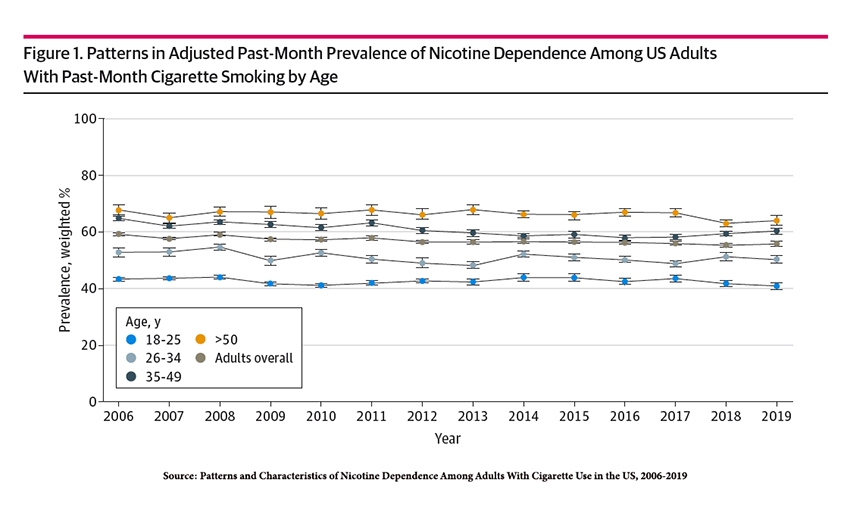The data comes from the National Surveys on Drug Use and Health a study of adults 18 years or older, living in the community, based on in-person, but computer-aided structured interviews. The current study looks at 152,000+ participants between 2009 and 2019, focusing on those who have smoked in the past month. Nicotine dependence was assessed, and the degree of dependence quantified. [1] The cohort include 54% males but was representative of the US population in most other ways. Overall, nicotine dependence among smokers dropped from 59% in 2006 to 56% in 2019, a percentage point difference of 3.52 and a percentage change of 5.91%. Here is the breakout of nicotine dependence by age.

While there are decreases in most age groups, the degree of nicotine dependence among our youngest, 18 to 25, was essentially unchanged over the interval at 41.7%. Those most dependent on nicotine were the oldsters, in this instance, those over 50, where the nicotine dependence was 64.4%. A more intriguing finding was that nicotine dependence was significantly increased in all age groups when other substance use disorders or major depressive episodes were present. Much as we have discussed with respect to cannabis, mental health plays a significant role in those who smoke.
The researchers conclude that there was little evidence of nicotine hardening over time and that given the high prevalence of nicotine dependence among the 50 and up crowd, messaging should be primarily directed toward them.
I have a slightly different take and believe that the rising degree of nicotine dependence across the age groups suggests that those remaining smokers are more hardcore. They have been told the health risks of smoking for most of their lives, so if they continue to smoke, they may be foolhardy, addicted, have mental health issues that make them more susceptible, or most likely a bit of all three. The researchers do mention that pharmacotherapy is useful, either blocking nicotine’s effect using varenicline or replacing smoking nicotine with a nicotine gum or patch. Would it be fair at this point to include vaping as a form of nicotine replacement therapy?
[1] Here are the items included in the Nicotine Dependence Syndrome Scale:
- Smoking more frequently in the morning than during the rest of the day.
- Finding it difficult to refrain from smoking in places where it is prohibited.
- Having strong cravings or urges to smoke.
- Needing to smoke more to achieve the same effect as before.
- Experiencing withdrawal symptoms when attempting to quit or cut down.
- Smoking even when ill or knowing that it worsens a health condition.
- Spending a significant amount of time smoking or recovering from its effects.
- Giving up important activities in favor of smoking.
- Continuing to smoke despite social or interpersonal problems caused by smoking.
- Giving up activities that were previously enjoyed in order to smoke.
- Being unable to control or cut down on tobacco use.
- Continuing to smoke despite being aware of the health risks.
- Needing to smoke soon after waking up in the morning.
- Being more addicted to nicotine than most other smokers.
A higher score reflects a greater nicotine dependence.
Source: Patterns and Characteristics of Nicotine Dependence Among Adults With Cigarette Use in the US, 2006-2019 JAMA Network Open DOI: 10.1001/jamanetworkopen.2023.19602




